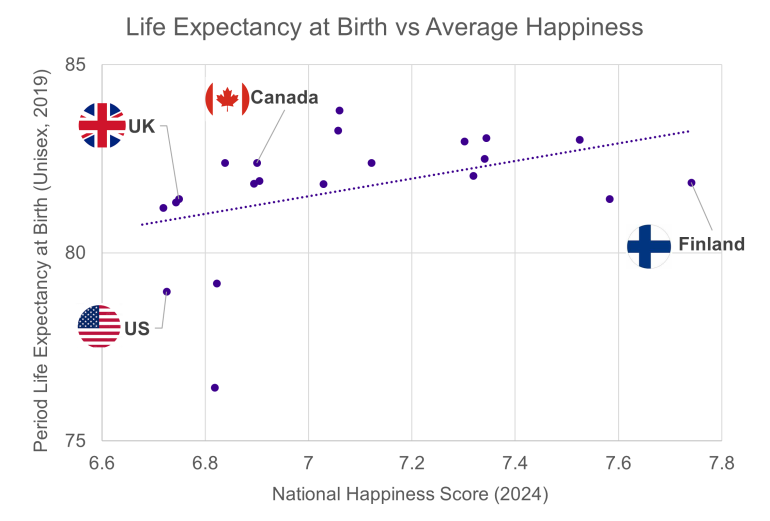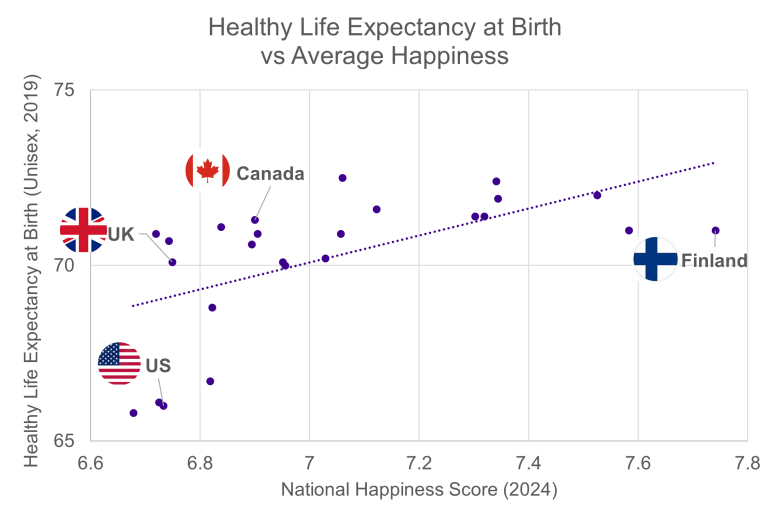Question:
Do happy people live longer?
Answer:
As always, it is quite difficult to determine causation, but results from the World Happiness Report 2024 indicate that there is some (albeit fairly weak) correlation between the average happiness score for a nation and their period life expectancy at birth.
The World Happiness Report is an annual publication that has been going since 2012 aimed at helping the UN track happiness in different nations around the world. Each year they survey representative cohorts in different countries with the Cantril ladder question – essentially asking people to rate their own happiness on a scale of 1-10. Finland has been measured as the happiest country in the world for the last 7 years in a row.
The chart below shows unisex period life expectancy from 2019 against average happiness in the 25 happiest countries in the world.

Source: Happiness scores from the World Happiness Report 2024. Life Expectancy at Birth from the Human Mortality Database (note, Life Expectancy for Israel taken for 2016, the latest year with available data).
Where there is some weak correlation between these two factors (the coefficient of determination is just under 20%), there are certainly plenty of other factors at play. The Report itself identifies positive correlations between happiness and the following factors: GDP per capita, social support, healthy life expectancy, freedom to make life choices, generosity and perceptions of corruption (with no analysis of any inequality metrics due to a lack of data); GDP per capita seems to have the greatest predictive power over a country’s happiness.
There is a stronger correlation between healthy life expectancy at birth and happiness, with the coefficient of determination increasing to over 30% when using this metric instead of period life expectancy. The fact that this correlation is not stronger has lead some to call for a move to using Wellbeing-Adjusted Life Years (WELLBYs) instead of Quality-Adjusted Life Years (QALYs) when assessing the impact of public spending programs.

Source: Happiness scores from the World Happiness Report 2024. Healthy Life Expectancy at Birth from the World Happiness Report 2024, originated from the World Health Organization.
Key takeaways:
- There is a weak correlation between a nation’s life expectancy at birth and their average happiness
- The correlation increases slightly if looking at healthy life expectancy
- The fact that this correlation is not stronger, with many other factors contributing to overall happiness, has lead some to promote the idea of using Wellbeing-Adjusted Life Years (WELLBYs) instead of Quality-Adjusted Life Years (QALYs) when assessing the impact of public spending.
Key questions for longevity stakeholders such as pension plans and insurers are:
- Will public health bodies switch to considering increases in WELLBYs to assess public health interventions?
- If so, will that have an impact on longevity or longevity improvements?
What do you think?
Would you expect more correlation between life expectancy and happiness? Or between Healthy Life Expectancy and Happiness? What is more important to you: to live a long life, a healthy life, or happy life?





